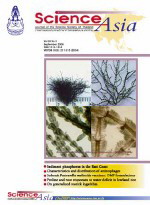ThaiScience
ThaiScience
SCIENCE ASIA
Volume 46, No. 1S, Month MARCH, Year 2020, Pages 19 - 26
Bacillus subtilis expressing dsvp28 improved shrimp survival from wssv challenge
Hirun Saelim, Suvit Loprasert, Amornrat Phongdara
Abstract Download PDF
White spot syndrome virus (WSSV) is a potent shrimp viral pathogen responsible for significant economic losses to shrimp aquaculture all over the world. Several studies have demonstrated efficient RNAi-based approaches for suppressing viral genes and reducing shrimp mortality. However, the application has been difficult in real practical use. The present work aimed to develop an efficient approach for the delivery of VP28 specific-siRNA using Bacillus subtilis, a novel live oral vaccine vehicle, to protect shrimp against WSSV infection. A plasmid that can function in both bacteria and eukaryotic cells was developed by combining pBE-sDNA and the pCMV promoter from the pcDNA4 plasmid to obtain pBE:cDNA4. Subsequently, to evaluate the efficacy of pBE:cDNA4 in vivo, dsGFP-expressing pBE:cDNA4 (pBE:cDNA4-dsGFP) and dsVP28-expressing pBE:cDNA4 (pBE:cDNA4-dsVP28) were used to knockdown target transcripts in WSSV-infected shrimp. A high survival rate was shown for WSSV-infected shrimp injected with pBE:cDNA4-dsVP28 at 7–14 days post-infection (dpi). The pBE:cDNA4-dsVP28 plasmid was transformed into B. subtilis, and B. subtilis was used as a delivery vehicle during oral feeding. WSSV-infected shrimp fed with B. subtilis carrying pBE:cDNA4-dsVP28 showed 91.67% survival compared to the control, which showed only 28.57% survival. The results here demonstrate the efficient delivery of specific siRNAs by using bactofection with B. subtilis.
Keywords
white spot syndrome virus, RNA interference, VP28, bactofection, B. subtilisSCIENCE ASIA
Published by : The Science Society of Thailand
Contributions welcome at : http://www.scienceasia.org/
